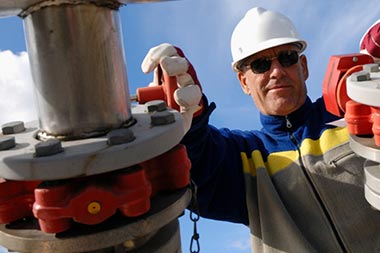
Materials Selection and Corrosion Management
The integrity, safety and profitability of field developments depend on the correct materials being used in their construction, completion and operation. The selection process requires accurate fluids data as well as expert assistance from corrosion and materials specialists. At OCTL, we can provide both of these crucial services. We review data from crude, gas and brine samples to ensure they are representative of field conditions. Where necessary, the water chemistry is also modelled to calculate reservoir composition and back-out contamination from drilling and completion fluids.
This data is then analysed using industry standard predictive corrosion software to consider corrosivity to carbon steel flow lines. Our tests take into account any protective effects from hydrogen sulphide in the system, application of glycols, flow regime to establish top of line and bottom of line effects and variation with oil and water cut-over field life. Based upon our assessments and flow regime data, the feasibility of a carbon steel line - with corrosion inhibitor applied if necessary - is defined to establish material suitability as well as the corrosion allowance required during the field’s life. The severity of the carbon steel corrosion regime and expected inhibitor performance determines the requirements of corrosion resistant alloy (CRA).
Most sub-sea wells - or those requiring a costly intervention in the case of materials failure - now specify the well tubing and wetted surfaces to be in a CRA for general well integrity. Selection of the most appropriate alloy can be a complex process. It requires expert knowledge of alloy limitations in relation to pitting, cracking and general corrosion resistance under the field brine salinity, temperature and pressure regime as well as the corrosive gas content. At OCTL, we use industry guidelines and field experience to select the most appropriate CRA for the field requirement and identify the material upgrades required for critical well items such as downhole safety valves, tubing hangers and seals.
Produced fluids and injected chemical compositions are also considered for compatibility with well elastomers as part of the overall materials selection process.
Where required, OCTL can also provide practical laboratory services to determine the performance of selected materials, corrosion inhibitors and elastomers as well as define water composition at high pressure to aid or validate materials selection.
Sitemap
- Home
- Consultancy Services
- Chemical Management
- Training
- Material Selection / Corrosion Management
- Field Chemistry Reviews
- Drilling, Completion and Well Stimulation
- Project Management
- Lab Services
- Production Chemistry
- Flow Assurance
- Well Productivity
- Analysis and QA Services
- R&D
- Contact Us
- About Us
- Clients + Projects
- Careers
- Equipment Sale

